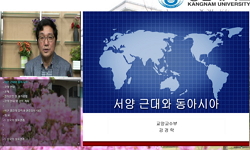유학이 근세일본의 사상사, 그 중에서도 정치사상사 전개의 기축이 되었고, 메이지 유신에도 중대한 역할을 담당했다는 점은 현재 한국 학계에서도 비교적 잘 알려져 있다. 그러나 해당 분...
http://chineseinput.net/에서 pinyin(병음)방식으로 중국어를 변환할 수 있습니다.
변환된 중국어를 복사하여 사용하시면 됩니다.
- 中文 을 입력하시려면 zhongwen을 입력하시고 space를누르시면됩니다.
- 北京 을 입력하시려면 beijing을 입력하시고 space를 누르시면 됩니다.

유학을 중심으로 본 근세·근대 일본사상사 논점 -2010년대 이후의 연구- = A Review on the Recent Studies of Early Modern & Modern Japanese Intellectual History
한글로보기https://www.riss.kr/link?id=A107401693
- 저자
- 발행기관
- 학술지명
- 권호사항
-
발행연도
2021
-
작성언어
-
-
주제어
일본사상사 ; 유학 ; 소라이학 ; 메이지유신 ; 동아시아 ; Japanese Intellectual History ; Confucianism ; Soraigaku ; Meiji Revolution ; East Asia
-
등재정보
KCI등재
-
자료형태
학술저널
-
수록면
141-171(31쪽)
- 제공처
-
0
상세조회 -
0
다운로드
부가정보
국문 초록 (Abstract)
유학이 근세일본의 사상사, 그 중에서도 정치사상사 전개의 기축이 되었고, 메이지 유신에도 중대한 역할을 담당했다는 점은 현재 한국 학계에서도 비교적 잘 알려져 있다. 그러나 해당 분야로 조금 깊이 들어가 보면, 여전히 근세일본사회 속 유학의 전모는 밝혀지지 않았다고 할 수 있다. 20세기 중반, 마루야마 마사오와 같은 세대 학자들이 이룩해 낸 일본사상에 관한 연구는, 후속 세대에 의해 비판과 수정·보완을 거듭하였다. 이들을 포함한 기존 연구들은 주로 근세일본 전기에 논의가 집중되어 왔다. 그러나 최근 십 년간, 근세일본 유학사에서 상대적으로 공백상태였던 근세 후기의 논의에 집중한 연구들이 등장하기 시작했고, 이들을 바탕으로 근대 사상사 연구 또한 진전되었다. 도쿠가와 중기의 소라이(徂徠)학열풍이 지나간 이후, 근세일본에서 유학의 사상은 어떻게 전개되었는지에 대한 관심, 그리고 그 연장선상에서 ‘서양’과 직면하게 된 근대일본의 사상과 어떻게 연결되는지에 관한 문제의식을 가진 새로운 세대의 연구자들이 등장한 것이다. 이 글에서는 이와 같은 근세일본의 유학사에 주목하여 2010년대 이후에 발표된 ‘근세’와 ‘근대’ 일본사상사 연구들이 유학을 어떻게 취급해왔는지 구체적으로 알아본다. 이들 연구는 ‘유학’을 동아시아 문화권의 공통분모로 상정하면서도 그 구체적인 내용의 차이를 분명하게 의식한다는 점에서 ‘일본’ 사상사라는 영역을 초월해 한국 및 다른 지역의 사상사 연구에도 시사하는 바가 크다. 이에 필자는 기존 일본정치사상사 연구 흐름을 염두에 두면서, 최근 십 년간 발표된 유학과 관련된 일본사상사의 주요 연구들을 관통하는 흐름을 포착하고자 한다.
다국어 초록 (Multilingual Abstract)
The recent Korean academia is quite well aware of the fact that Confucianism served as the basis for the development of the history of modern Japanese thought, especially political thought, and played an important role in the Meiji Revolution. However...
The recent Korean academia is quite well aware of the fact that Confucianism served as the basis for the development of the history of modern Japanese thought, especially political thought, and played an important role in the Meiji Revolution. However, one can say that the full picture of Confucianism in Tokugawa and Meiji Japanese society is still not properly drawn. Since the mid-twentieth century, the study of Japanese political thought by Masao Maruyama and the scholars of the same generation has been repeatedly criticized, corrected, and supplemented by subsequent generations. Yet, previous studies including these have focused mainly on the early part of Tokugawa Japan. But since 2010, researches focusing on the late Tokugawa period, which were relatively neglected in the history of Confucianism in modern Japan, have begun to emerge. These studies are interested in how Confucian history has developed after the fad of Soraigaku passed. The question of how Confucianism and Western civilization were related has been carefully scrutinized by this new generation of researchers. They consider Confucianism as a common ground for East Asian intellectual world, but at the same time, they put much emphasis on the differences of how Confucianism were handled in each East Asian society. This paper attempts to capture a such flow in the recent studies of Japanese intellectual history.
동일학술지(권/호) 다른 논문
-
- 한국사상사학회
- 최봉준 ( Choi¸ Bong-jun )
- 2021
- KCI등재
-
- 한국사상사학회
- 허태용 ( Huh¸ Tae-yong )
- 2021
- KCI등재
-
- 한국사상사학회
- 한보람 ( Han¸ Bo-ram )
- 2021
- KCI등재
-
사상, 철학, 그리고 유학: 송명유학에 접근하는 세 가지 경로
- 한국사상사학회
- 이찬 ( Lee¸ Chan )
- 2021
- KCI등재




 KISS
KISS






